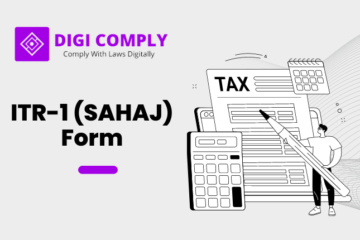Fulfilling the obligation of filing Income Tax Returns (ITR) is of paramount importance for every taxpayer in India. The government has imposed specific deadlines for ITR filing, making it imperative for individuals to adhere to these timelines to steer clear of penalties. In this comprehensive article, we shall delve into the recent changes in penalties for missing the ITR filing deadline and grasp their implications for taxpayers according to their income levels.
The Previous Penalty Structure:
Until the financial year 2019-20 (AY 2020-21), taxpayers who failed to meet the ITR filing deadline were subject to a penalty of up to Rs. 10,000. This large fine prevents delays and highlights the importance of filing taxes on time. The deadline for filing ITR is extended until the conclusion of the financial year, i.e., March 31, granting taxpayers ample time to complete the return submission process. However, it was observed that despite the extended deadline, some individuals continued to delay their tax return filings, leading to complications in the revenue collection process and tax compliance.
The Revised Penalty Structure:
- Recognizing the need for promoting timely filing and enhancing tax compliance, the government, in Budget 2021, implemented noteworthy modifications to the penalty structure associated with belated ITR submissions.
- The maximum penalty for filing a belated ITR has been reduced to Rs. 5,000 from FY 2020-21 (AY 2021-22) onwards.
- This reduction in the penalty amount has been aimed at striking a balance between enforcing tax discipline and easing the burden on taxpayers who may have genuine reasons for missing the initial deadline.
- Additionally, in an effort to further emphasize the importance of timely tax return submissions, the government decided to advance the deadline for filing a belated ITR.
- As per the updated regulations, taxpayers must now ensure the submission of their belated ITR by December 31 of the relevant assessment year (e.g., December 31, 2023, for FY 2022-23, AY 2023-24).
- This revised deadline provides a narrower window for late filings, compelling taxpayers to be more proactive and responsible in meeting their tax obligations promptly.
Reason for the Penalty Reduction:
- The reduction in the maximum penalty for filing a belated ITR can be attributed to the government’s decision to shorten the time allowed for return filing.
- The previous deadline until the end of the financial year (March 31) provided taxpayers with nearly nine months to complete their tax return submissions.
- But, the longer deadline made people delay, causing more late tax filings and non-compliance.
- To address this issue, the government took the bold step of advancing the deadline to December 31, thereby reducing the window for late filings.
- This strategic move aims to instill a sense of urgency among taxpayers, motivating them to fulfill their tax responsibilities in a timely manner.
- Consequently, the maximum penalty for belated ITR filings has been halved to Rs. 5,000, acting as both a deterrent and an incentive for taxpayers to file their returns promptly.
Penalty for Small Taxpayers:
- Recognizing the diverse income levels and financial capacities of taxpayers, the government has also taken into account the interests of small taxpayers with total income not exceeding Rs. 5 lakh during a fiscal year.
- For these taxpayers, the maximum penalty for filing ITR after the deadline is significantly lower, at only Rs. 1,000.
- This special consideration for small taxpayers is a commendable measure to ease their financial burden and encourage tax compliance.
- By imposing a lower penalty for late filings, the government seeks to provide relief to low-income individuals who may face genuine challenges in meeting tax deadlines.
- This approach reflects the government’s commitment to inclusivity and its understanding of the unique circumstances faced by taxpayers with modest incomes.
Consequences of Missing the Deadline:
- Failing to file ITR within the specified deadline can have significant financial implications, regardless of whether an individual owes any taxes or not.
- The penalties may vary based on the date of filing, as explained above. For instance, taxpayers who miss the deadline by just a few days might incur a lower penalty compared to those who delay their filing for an extended period.
- In addition to the monetary penalties, there are other consequences of missing the deadline.
- For instance, delayed ITR filings may result in delayed processing of tax refunds, causing financial inconvenience to taxpayers who are eligible for refunds.
- Moreover, non-compliance with tax return deadlines may attract scrutiny from the tax authorities, potentially leading to further investigations and audits.
Conclusion:
Filing Income Tax Returns remains a critical obligation for all taxpayers in India. The government’s initiative to update the penalty structure aims to promote timely filing and reduce the burden on small taxpayers. The revision of the penalty amount and the advancement of the deadline serve as powerful tools to encourage tax compliance, streamline the revenue collection process, and enhance overall tax discipline in the country.
If You have any queries then connect with us at support@legalsuvidha.com or info@digicomply.in & contact us & stay updated with our latest blogs & articles





